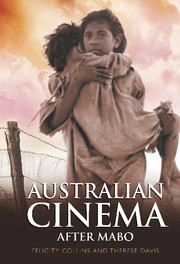Book contents
- Frontmatter
- Contents
- Acknowledgments
- Part 1 Australian Cinema and the History Wars
- 1 Backtracking after Mabo
- 2 Home and Abroad in Moulin Rouge, The Dish and Lantana
- 3 Elites and Battlers in Australian Rules and Walking on Water
- 4 Mediating Memory in Mabo – Life of an Island Man
- Part 2 Landscape and Belonging after Mabo
- Part 3 Trauma, Grief and Coming of Age
- Bibliography
- Index
4 - Mediating Memory in Mabo – Life of an Island Man
Published online by Cambridge University Press: 31 January 2011
- Frontmatter
- Contents
- Acknowledgments
- Part 1 Australian Cinema and the History Wars
- 1 Backtracking after Mabo
- 2 Home and Abroad in Moulin Rouge, The Dish and Lantana
- 3 Elites and Battlers in Australian Rules and Walking on Water
- 4 Mediating Memory in Mabo – Life of an Island Man
- Part 2 Landscape and Belonging after Mabo
- Part 3 Trauma, Grief and Coming of Age
- Bibliography
- Index
Summary
Since the High Court's judgment in Mabo and others v. The State of Queensland (No 2) (1992), ‘Mabo’ has become a household word in Australia. In his commentary on the cultural implications of the decision, Jeremy Beckett, anthropologist and witness for the plaintiffs, claims that media and politicians have added a new word to the Australian vernacular. ‘“Mabo”’, he says, ‘has come to stand for the whole issue of Aboriginal land rights, as in “Mabo law”, “Mabo deal”, “Mabo show” and of course, “Mabo madness”; if it has not already become a verb, it soon will.’ For Beckett, the over-use of ‘Mabo’ in popular discourse has, among other effects, ‘overshadowed’ the fate of the leading litigant. Put simply, ‘Mabo’ is a name without a face. This cultural oversight, this gap between a judgment and a historical subject, prompted the making of the award-winning biographical documentary film Mabo – Life of an Island Man (Trevor Graham, 1997). In this chapter we undertake a close analysis of this film, considering the role it has played in mediating public recognition of both the Mabo decision and Mabo ‘the man’. We are interested in how this documentary has become a popular history of Mabo and what this success tells us about shifts in documentary filmmaking in Australia in the 1990s and the forms of spectatorship they can enable.
- Type
- Chapter
- Information
- Australian Cinema After Mabo , pp. 59 - 72Publisher: Cambridge University PressPrint publication year: 2004



